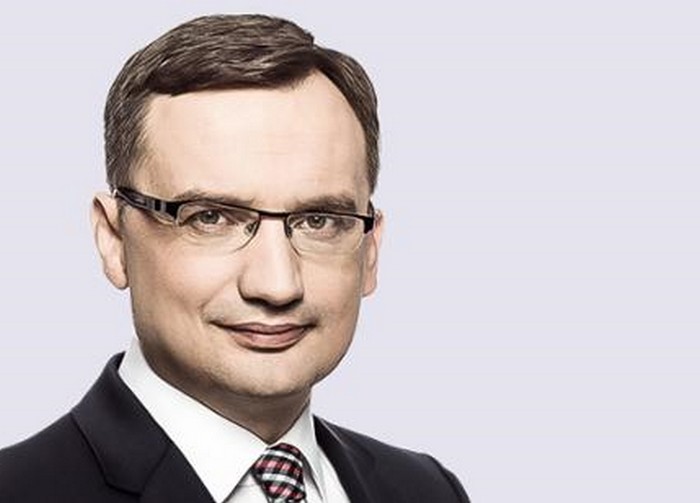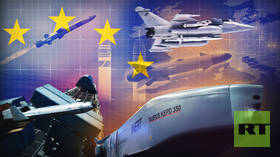Well, it's not precisely what the author describes - about the genesis, but about the policy and predictability of individual players, of course...
Very good text.
reprint
Trump, Putin and the brutal fact about global politics
John Mearsheimer was right. In 2014, he warned that if the West extended control of Ukraine, the Russians would strike. They will not take over the full Ukraine – but they will strike, and their determination will be so large that they will never give up. Why? due to the fact that that's the balance of power in the world. The balance of strength can be ignored, but it has its painful consequences.
Power policy in the planet of relations between countries
Politicians in many European countries – and especially Poland – are outraged at the United States' position towards the war in Ukraine. No wonder: for many years they have consistently applied value-based rhetoric, as if global relations were based primarily on them. But the fact is completely different. Relations between countries are based on violent force. This force and only force is the actual basis of these relations. Periodically, it may seem different, especially erstwhile there is peace. What seems to be meaningless, however. In the key moments, the curtain falls, and the eyes show what has always been behind it. It's like saying that relations between a citizen and a government are based on values. Sure, they are – as long as the citizen behaves according to the government's will. However, if a citizen refuses to pay taxes or commits a crime, force enters. Ultimately, this force is the basis of the relation between the citizen and the government. Values are only a communicative for the "peace" period between the 2 entities.
In the 19th century, the nature of interstate relations was apparent to all those active in politics. Why? due to the fact that they read classical authors. Well, the nature of these relations was briefly and completely clearly described by Tukidides, a prominent Greek historian surviving in the 5th century before Christ. This superb author watched with his own eyes the brutal Peloponnesian War between Athens and Sparta. Yes – many values were already said. This argument was utilized especially by those who were weaker and tried to defend themselves from the stronger. However, the powers – Athens and Sparta – led natural politics, i.e. based solely on force and striving for full dominance. Tukidydes outlined this in the celebrated “Melian Dialogue”.
Tragedy of Melos Island
The reader will find the full dialog in Book 5 of the Peloponnese War, paragraphs 84 – 116. The thing is short and can be found online. To realize the basis of global relations, there is no request to read any another text. This short dialog is absolutely sufficient.
What's he talking about? During the Peloponnese War, the Athenians attempted to crush Sparta by extending their control in the Aegean Sea. There was a settlement on the tiny island of Melos that the Spartans had previously founded. Melos so maintained political relations with Sparta. Conscious of their own weakness, the Melians refused to take sides. They wanted to stay neutral.
However, the Athenians felt that Melos' neutrality was a political threat to them. If they allowed Melos to be neutral, another cities could go the same way. The Athenians have decided that in their own interests they cannot tolerate it. Tolerance would endanger their vital interests. Thus, they demanded of Melos absolute subjection. They justified this in their sentences, which thanks to Tukidides achieved immortality.
The Athenians said:
"We, like you, know very well that justice in human relations is only then a decisive minute if on both sides equal forces can safe it; and erstwhile it comes to the scope of possibilities, the stronger attain their goals, and the weaker yield."
How do you realize that? Justice (our “values”) only matters erstwhile 2 equally strong partners are talking. No 1 can hurt another. They're just as strong, so alternatively of fighting, they talk about justice. erstwhile there is no balance of power, there is no value. There's violence.
The Melos case had a tragic end. The Athenians explained to the Melians why it would be better if they gave up. The plan was simple. Athens is powerful, Melos is weak. Athens wants control. If Melos surrenders, he'll survive. If Melos resists, he'll be destroyed. Tertium non datur.
What did the Melians do? First, they inactive tried to appeal to justice. Second, they said they were counting on Sparta's help.
The Athenians reiterated that there is no justice in this relation due to the fact that they are stronger. Sparta's aid did not come. As a result, Melos was destroyed: the city was demolished, men were murdered, women and children were taken prisoner. That's how the communicative of Melos ended.
Tukidides' Melian dialog – short, brutal and absolutely clear – is simply a classical of literature. Those who read and analyzed it knew how politics worked.
John Mearsheimer's “Tragism of Power Politics”
In the 20th century it began to be forgotten. Classics – no more reading. The reasons for this are different and there is no area for analysis. The communicative of values (Mellian "justice") began to replace reasoning in terms of real policy.
At the same time, there were and are those authors who continued a realistic reflection on global policy. The most crucial of these is John Mearsheimer. Mearsheimer was born in 1947 in fresh York City. He has been a lecturer at the University of Chicago for many years. He created a theoretical concept called "an offensive reality". In fundamental matters, his concept is footnotes to Tukidides' “Melian Dialogue”.
Mearsheimer analyzed many armed conflicts, from modern times to planet War II. He watched the conflict between the United States and the russian Union live. In 2001, he published his most crucial book, The Tragedy of large Power Politics. It was not until 2020 that it was published in Poland under the title "Tragism of Powers Policy".
The work has more than 500 pages and includes a discussion of many wars. In fact, the thesis of Mearsheimer is simple and contained in the words of the Athenians: "When it comes to the scope of possibilities, the stronger accomplish their goals and the weaker yield."
According to Mearsheimer, individual states prosecute 1 and only 1 goal: gaining full dominance over their opponents. Who's the enemy? All another countries. As a result, the real goal of all country is to accomplish complete control of the world. It's a global hegemon position.
The reason for this is simple. He presented it in the celebrated “Leviaans” Thomas Hobbes. There is no policeman in the planet of global politics. There's no court either. The rulers, wrote Hobbes, stand other each another with their swords bare. No 1 knows erstwhile he'll be attacked. They're ruled by fear.
Fear, writes Mearsheimer, generates aggression. The state is never safe. The only thing that can defend them from others' aggression is to extend their own dominance. That is why countries – as far as they can – act offensively. They're trying to impose control on everyone around them. In practice, only the most powerful players are capable of this. These players are actually trying to do it. Most countries do not have a view of global dominance, which is why they are larger.
Mearsheimer shows this on a well-known example of planet War II. The 3rd Reich feared the attack of the French and Soviets. She decided to make a tactical pact with the Soviets to dominate the French and the remainder of Western Europe – but only to strike the Soviets in the next step. According to Mearsheimer, the full Nazi communicative about “Lebensraum” was primarily a narrative. In fact, the 3rd Reich in its abroad policy pursued the principles of force policy. Then why did she lose? due to the fact that she wasn't as powerful as she imagined. According to rationality, it should have limited its ambition and not decided to go to global war. In another words, the 3rd Reich overestimated its own strength and lost.
United States
This is where America enters Mearsheimer. About the defeat of the 3rd Reich, the decision of the United States to join the war prevailed. Mearsheimer explains this decision very simply. The Americans feared that the 3rd Reich would come to its conclusion: it would defeat all European countries and dominate the russian Union. If all of Eurasia were under the control of the 3rd Reich, the 3rd Reich would make a direct threat to the United States. Americans, Mearsheimer writes, thought Hitler would not stop. The nature of global policy would push him to face the United States. With the resources of all Eurasia behind him, Hitler could conquer the Americans and conquer the world. That's why the Americans joined the game. They defeated the 3rd Reich and established American control of Europe. They were incapable to defeat the russian Union, and the russian Union was incapable to defeat them. Both sides knew that. They showed greater prudence than before the 3rd Reich. That's why they fought nothing but cold, not hot war. They understood the balance of strength.
For Mearsheimer's thinking, the absolutely formalist event was the 1962 Cuban crisis. The Soviets felt they were stronger and decided to decision with their rocket installations to the borders of America. The Americans felt they were severely threatened and demonstrated their readiness to conflict. The Soviets retreated due to the fact that they understood that they had bid and are not as strong as they thought. erstwhile again, they proved more discreet than the 3rd Reich.
Mearsheimer believes that this balance changed in 1991. The russian Union has fallen. The Americans have become far more powerful than the Russians. That is why they began to decision forward and took over military control of another countries. In Europe they expanded NATO: Poland, the Baltic States and another countries joined it. Russia, writes Mearsheimer, had to accept it. She had no choice: she did not have adequate force to halt Americans.
Then – that's what Mearsheimer thinks – the Americans made the mistake of the 3rd Reich. They thought they were stronger than they truly were. At the 2008 Bucharest summit, they announced that they would take military control of Georgia and Ukraine. Russia took this as a vital threat to its own interests. The Cuban crisis in a fresh installment. The Russians, according to Mearsheimer, could not force Americans to quit their desire to take Georgia on a diplomatic road, so they decided to take military action. They achieved the desired effect; America felt that it did not have the strength to take over Georgia. However, she tried to take over Ukraine, says Mearsheimer. This is why Russia hit for the first time in 2014.
Forecast from ‘Forreign Affairs’
Mearsheimer believes that this balance changed in 1991. The russian Union has fallen. The Americans have become far more powerful than the Russians. That is why they began to decision forward and took over military control of another countries. In Europe they expanded NATO: Poland, the Baltic States and another countries joined it. Russia, writes Mearsheimer, had to accept it. She had no choice: she did not have adequate force to halt Americans.
Then – that's what Mearsheimer thinks – the Americans made the mistake of the 3rd Reich. They thought they were stronger than they truly were. At the 2008 Bucharest summit, they announced that they would take military control of Georgia and Ukraine. Russia took this as a vital threat to its own interests. The Cuban crisis in a fresh installment. The Russians, according to Mearsheimer, could not force Americans to quit their desire to take Georgia on a diplomatic road, so they decided to take military action. They achieved the desired effect; America felt that it did not have the strength to take over Georgia. However, she tried to take over Ukraine, says Mearsheimer. This is why Russia hit for the first time in 2014.
Forecast from ‘Forreign Affairs’
In 2014, John Mearsheimer published a celebrated article in "Foreign Affairs" entitled "Why the Ukraine Crisis Is the West's Fault: The Liberal Delusions That Provoked Putin". He predicted that if the Americans continued to effort to extend military control over Ukraine, the Russians would strike again. It's like the 1962 Cuba case – for Russia Ukraine is besides important, he claimed. According to Mearsheimer – the Russians will not be able to take over the full Ukraine, due to the fact that they have no power to do so, but they will strike anyway – they will do everything in their power to prevent Americans from crossing their borders. As we know, in 2021 the Russians sent an ultimatum to the Americans, demanding, among another things, a complete withdrawal from Ukraine. The Americans disagreed, and Russia struck in February 2022. Mearsheimer thinks it had to be.
In his opinion, the attack on Ukraine can and must be condemned from a moral perspective. This applies especially to all the wickedness committed by the Russian armies. From the position of real politics, however, it is, according to Mearsheimer, as if to condemn the cloud for its rain. global policy is based on strength and all parties should respect the balance of this force in line with the simple principle: "stronger accomplish their goals and weaker yield". The Americans, consider Mearsheimer, overestimated their own strength and went besides far in Ukraine, so the Russians responded. The sceptics of Mearsheimer correspond to a simple analogy: let them think what the Americans would do if Russia announced that Canada or Mexico were to enter into a military pact with Moscow. They would attack Canada immediately, as Mearsheimer responds, due to the fact that the Russians would disrupt the balance of strength and have severely threatened America.
Catholic Perspective
From a Catholic perspective, this is fatal. If all players in the global arena had followed the teachings of the Church, war would not have erupted at all. Pius XI wrote this beautifully in the encyclical “Quas primas”: if all the rulers admit the authority of Jesus Christ, there will be lasting peace in the world. Unfortunately, the rulers refuse to admit the authority of Jesus Christ. In order to accomplish the perfect peace of Pius XI, a universal designation of this power would be needed. If 1 entity recognises it but the another does not, the another will act as a force policy. Then there's no another way. It's a vicious ellipse that humanity has never been overcome. Mearsheimer, who was raised as a Catholic, frequently says this: he points out that people are prone to evil and that tendency simply cannot be removed in this world. This means that all country, whether it wants it or not, must take into account the policy of force.
Conclusion: Putin and Trump
U.S. president Donald Trump said that in his opinion the origin of the outbreak of the war of 2022 was the US's willingness to include Ukraine in NATO. He declares that he understands the concerns of the Russian Federation and intends to make peace. Pentagon chief Pete Hegseth says Ukraine will not recover its full lands. In another words: Donald Trump's administration felt that he did not have the strength to take control of Ukraine. We may not like it. We'd alternatively have Ukraine in NATO. We would like the Russians to be proud, to lose spectacularly and to gotta retreat all their troops from Ukraine. However, the Americans acknowledged – as Mearsheimer wrote already in 2014 – that the balance of forces between them and the Russians was different and so a step back. Just like the Soviets did in 1962.
There's quite a few talk about values. Behind the curtain of values is, unfortunately, only bare force.
Paweł Chmielewski
Trump, Putin and the brutal fact about global politics - PCH24.pl












![Karta Rodziny Mundurowej wkracza do Sejmu. Frysztak: nic nie stoi na przeszkodzie, by poszerzać grono uprawnionych [WYWIAD]](https://cdn.defence24.pl/2025/11/05/800x450px/0Yt7M1tzNYllfs9JACKlyaCkRybQn0D6JoxRbblo.voli.webp)





